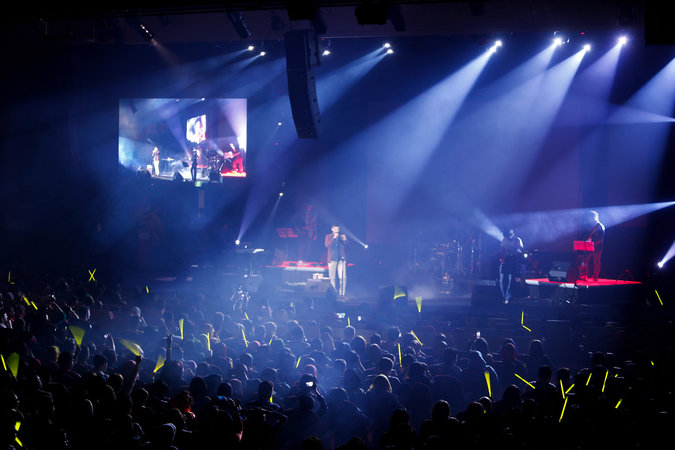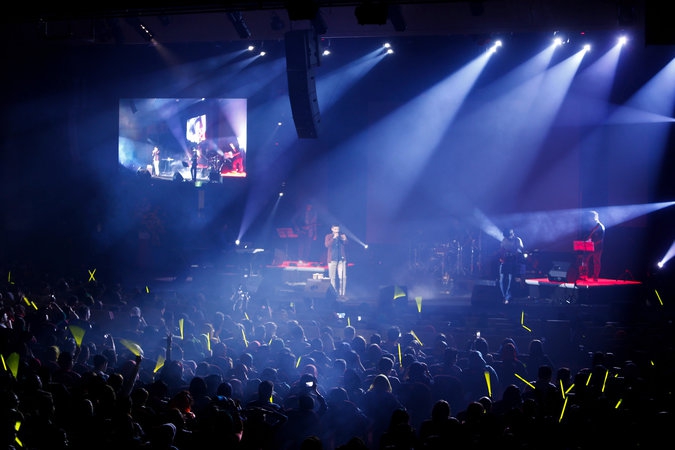 TEHRAN � The onetime underground pop singer smiled shyly as the high-pitched screams of his teenage fans drifted into his dressing room, just before his show on Friday. This superstar thing, he seemed to be saying, takes some getting used to.
TEHRAN � The onetime underground pop singer smiled shyly as the high-pitched screams of his teenage fans drifted into his dressing room, just before his show on Friday. This superstar thing, he seemed to be saying, takes some getting used to.�Xaniar! Xaniar! Xaniar!� the crowds roared from the auditorium in North Tehran.
In less than 15 minutes,�Xaniar Khosravi, 29, an Iranian-Kurdish performer whose upbeat music was long deemed by Iran�s powerful Ministry of Islamic Guidance and Culture as illegal for being too Western, would step onto a stage before thousands of fans for his second official concert ever (the first was the night before).
Mr. Khosravi was more accustomed to hearing his love songs, distributed on the Internet, blasting from car sound systems on Tehran�s crowded streets. His voice was famous, but only a few knew his face.
�I was like a football player without a pitch to play on,� Mr. Khosravi said of his days as an illegal singer. �I had no album, just a collection of songs, and no concerts. It was as if I had no identity.�
[caption id="" align="alignnone" width="600"]
 Mr. Khosravi, second from right, who has distributed his music on the Internet, joined members of his band for photographs backstage before a concert.CreditNewsha Tavakolian for The New York Times[/caption]
Mr. Khosravi, second from right, who has distributed his music on the Internet, joined members of his band for photographs backstage before a concert.CreditNewsha Tavakolian for The New York Times[/caption]That had all changed with a ministry official�s stroke of a pen, the singer�s assistants explained while nipping from strawberry mocktails in the V.I.P. room next to the auditorium where Mr. Khosravi�s entourage had set up shop.
Nobody really wanted to say it, as politics is a subject to avoid for the few who are allowed to stand in the limelight in Iran, but Mr. Khosravi�s presence on the stage was the direct result of the election of Hassan Rouhani,�a self-proclaimed moderate, as president in June. During his campaign, Mr. Rouhani repeatedly called for more artistic freedoms.
�Let�s just say that before no official would even meet with me,� Mr. Khosravi said. �But now I am allowed to have four concerts.�
Despite Mr. Khosravi�s new concert career, Rouhani supporters have been disappointed at the slow pace of change, with few other signs of cultural relaxation in Iran�s capital. A female singer was allowed to sing a song by herself in a musical, �In the Last Days of Esfand,� a first in the Islamic republic�s 35-year history. Next week, an Iranian singer formerly based in the United States,�Habib Mohebbian, will be allowed to publish a book of poetry.
He is not allowed to sing, however.
Several reformist newspapers were closed by the conservative judiciary and remain shuttered, and social media and millions of websites are still blocked.
Mr. Khosravi�s concert, therefore, was mostly a chance to do something different in this city of 12 million, an opportunity quickly seized by Iran�s entertainment-starved young people.
Hundreds of boys wearing baseball caps and girls covered with brightly colored head scarves waited excitedly in front of the concert hall, having been dropped off by parents who in all likelihood also shelled out the $20 cost of a ticket.
Chewing gum and texting on their smartphones, few of them could recall the days when hard-line vigilantes raided pop concerts, calling the events �harbingers of a Western cultural invasion� and shutting down sound systems and at times attacking the audience members.
Still, the fact that an underground singer was suddenly allowed to perform was widely perceived as a miracle.
�We never expected him to be able to give a concert,� said Yasaman Tehrani, 21, a civil engineering student wearing light orange lipstick. �I think he changed some of his lyrics in order for his songs to be more acceptable. I don�t care as long as we can enjoy ourselves.�
When the gates opened, they all rushed in, but only after having passed a gate where a huge policeman and a colleague in plainclothes checked all the head scarves to make sure they did not reveal too much hair.
After that, the long line of teenagers passed a huge billboard showing a portrait of Mr. Rouhani, smiling like a benevolent grandfather, accompanied by his slogan: �The Government of Foresight and Hope.�
Kimia Faroghi, a 17-year-old high school student, said that she hoped that someday her favorite American singers, Justin Timberlake and Christina Aguilera, would give a concert in Tehran, a thought that made her friends giggle.
�Normally, we don�t have that many concerts here in Tehran,� Ms. Faroghi said, adding that she did not vote for Mr. Rouhani, �because I was too young to vote at the time.�
Backstage, Mr. Khosravi changed into a dark blue Versace vest and took some selfies with his band of young musicians before his performance.
Green laser beams flashed throughout the 2,000-seat concert hall as teenagers waved yellow fluorescent glow sticks, yelling for Mr. Khosravi. Everybody had to sit in allocated seats, and while boys and girls were allowed to sit next to one another, teams of Islamic hall monitors routinely passed by correcting those women whose head scarves were about to fall off.
As in all public halls in Iran, a large portrait of the country�s supreme leader, Ayatollah Ali Khamenei, hung on the left of the stage, and one of the founder of the Islamic revolution, Ayatollah Ruhollah Khomeini, hung on the right.
Mr. Khosravi kicked off the evening with one of his big hits, �Genuine Idea.� Drums pounded, guitars screeched and three huge video screens showed images of forests and rivers alternating with shots of the band members.
Dancing, or �harmonious movements� to the ruling Shiite Muslim clerics, is forbidden in Iran, so everybody rocked in their seats, waving their arms during the more rhythmic songs.
�It�s just you in my thoughts, I�m looking for a genuine idea, I want to be in your heart forever,� sang Mr. Khosravi, who is married. �Is it even possible at all that we are apart? Come put your hands in mine.�
�We love you, Xaniar!� girls yelled at the top of their lungs.
In one of the front rows, a family of three could be seen crying throughout the performance. Approached after the show, one of the family members, an older woman who had looked somewhat out of place, explained that her son, Amir Rad, 24, was the band�s drummer.
Her son�s love for music had long been a point of contention for the family, said his mother, Fariba Rad, who said that she, like most Iranian parents, wanted him to become a doctor or an engineer. �We always told him he was wasting his time with those drums,� she said as her husband, Ali Rad, nodded in agreement. �But we were wrong, he really did it, and we are so proud.�
Before the show, Mr. Khosravi had said that for years he had �pain in his heart� when he thought of giving a concert, knowing that it was nearly impossible.
�I wish all underground singers can have their concerts,� Mr. Khosravi said. �Maybe we will have to wait for some time, but it will happen.�
By The News York Times
The Iran Project is not responsible for the content of quoted articles.











